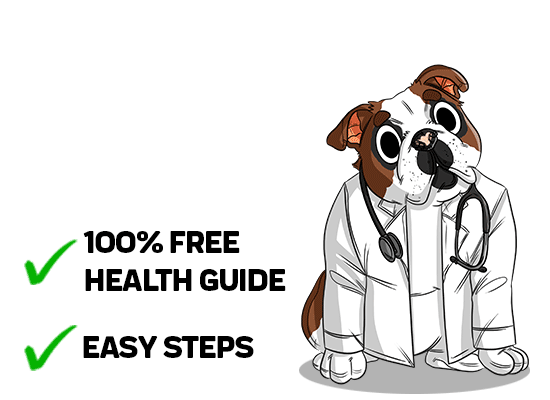- Blood Clots in Dogs: What are They?
- How to Figure Out If Your Dog's Blood is Clotting
- The Many Possible Causes of Blood Clots in Dogs
- How to Treat Dog Blood in dog Urine
- Dogs that are Most Likely to Experience Blood Clots
- How CBD Oil Can Help Dogs with Blood Clots
- Canine CBD Oil for Blood Clot Pain Relief

Blood in the stools is often mentioned as a symptom of something very dangerous, and people are told to seek medical attention immediately if they notice that their pets are excreting stools with blood in them. But have you ever found yourself in a situation where your dog’s urine contains blood? If so, then you already know what actions to take when the situation arises. But if this has never happened with your pup before, then take notes and adhere to our guidelines. Blood clots are not something to treat casually or take lightly.
The first thing to mention is that blood clots in dog urine are very serious. They warrant a severe medical emergency and you should dial the number to your veterinarian the moment you realize your dog's urine contains blood. From there, you'll want to schedule the soonest available appointment for your dog, and if there are no openings available within a day or two, you'll need to consider taking your pet to the emergency vet hospital. That is a glimpse into the severity of blood clots in the urine.
The reason blood clots require such rapid medical attention is that the source of the blood clot is unknown until a dog is examined by a professional. A blood clot in your dog's urine is not one hundred percent life-threatening as it is, but the seriousness of the issue can only be determined during a thorough analysis of everything going on in your dog's body. Once the origin of the blood clot is identified, you'll have more clarity and insight into what is going on with your dog. Until then, you should treat urination with blood clots as a very serious matter.
We wanted to make sure you were aware of the gravity of the situation right away. Now that we've made sure you know that blood clots in dog urine deserve prompt treatment, let's discuss blood clots and talk about what they are exactly. We will also mention the causes of blood clots as well as provide you with further information about how to help your dog feel better when faced with a blood clotting problem.
Blood Clots in Dogs: What are They?

Remember how the location of your injury started to bleed but very quickly stopped releasing blood? The reason your open wound did not bleed for hours and hours is due to the teamwork of blood proteins and platelets. They seal the skin, if you will, by forming a bond and acting as a barrier between the open air and the inside of your body.
They are like a second skin, if you will, and the two work in tandem until your skin is able to regenerate its cells and fully heal the place where you were injured. In general, blood clots are the result of platelets at work. Within the blood of your canine companion are blood vessels and proteins. The two cell-like structures work together as a team to prevent blood from leaving the body. Think of a paper cut that you've gotten or an injury that broke through your skin.
The same goes for dogs. Clotting of the blood is an absolutely essential process of healing a canine’s open wound. Without the ability to form clots, blood would continuously leave the body and cause your dog's blood levels to drop immensely. To avoid the worst-case scenario of massive blood loss, healthy pups have cardiovascular systems that clot blood automatically and effectively. Issues arise when blood clots appear in unwanted locations.
Blood clotting is ideal, most of the time. However, if blood clots are present in a dog's urine, it is a cause for concern. Known as hematuria in medical terms, blood in the urine of your dog is categorized in one of two ways.
The two types of hematuria in canines are…
- Gross hematuria
- Microscopic hematuria
So what’s the difference between the two? Well, gross hematuria is the form of blood in dog urine that you can see with your naked eye. Gross hematuria is visible in your dog's urine, so you'll be able to tell that your dog has a case of blood clots in the urine simply by observing your dog's urine. On the other hand, microscopic hematuria is exactly what it sounds like!
This type of hematuria can only be viewed from the lens of a microscope, meaning that there is no way of knowing if your dog's urine contains blood without having a urine sample observed and analyzed by lab technicians. So, gross hematuria is definitely easier to catch and identify, whereas you would have to rely on symptoms and obvious signs of discomfort in order to figure out that something odd is going on with a dog that has microscopic hematuria.
No matter the type of hematuria that your dog is experiencing, blood in your pup's urine is nothing shy of uncomfortable. Along with discomfort to the utmost degree, blood in the urine of dogs can cause premature deaths if treatment is not sought for the problem. But how do you know that your dog is experiencing blood in his or her urine, especially if you have no way of seeing blood in the urine of your pup? Well, there are many symptoms that coincide with blood clotting in canine urine, so let’s discuss the side effects of dog blood clots so you know what to look for!

How to Figure Out If Your Dog's Blood is Clotting
Gross hematuria is fairly easy to detect. The only way you can actually miss the most obvious sign of gross hematuria is if you never ever look at your dog’s urination. Pet owners who always monitor what goes in and comes out of their dogs will notice blood in their dogs’ urine right away. The chances that you won’t realize that your dog has gross hematuria are very slim. But even then, this would require that you watch your pup use the bathroom and check his or her urine after every potty break, which is really hard to do day after day.
If you suspect that your dog has gross hematuria, a telltale way of getting a straight answer is by having your pup use the restroom on a light-colored surface. This can be tricky, seeing as dogs are very particular about where they urinate, and it is hard to convince a pup to use the bathroom in an unfamiliar area, but try your best! Your dog might make it easy for you and urinate on a paper towel or an old white sheet without you having to give an arm and a leg for it to happen.
Also, as we mentioned previously, it is nearly impossible to know that your dog is experiencing blood clots when urinating if your dog has microscopic hematuria. Although unfortunate for your dog, it is good to know that there are specific signs that indicate the presence of blood clots in dog urine, beyond actually seeing blood in your doggy’s urine.
The reason that dog blood clots in urine occur alongside other physical symptoms has more to do with the root cause of the blood than the blood clots themselves. Blood clots in dog urine are usually a sign of something bigger, like kidney disease or an autoimmune disease, to name a couple of examples.
The most common signs that pet owners see when their dogs have blood in their urine are...
-
Nausea

- Vomiting
- Aggressive behavior
- Disinterest in food and water
- Outbursts of paralysis
- Unusual sleep patterns
- Shortness of breath and chest pain
- Excessive panting despite little to no exercise
- Grooming that seems obsessive and over the top
- Barking, whining, or crying more than usual
The Many Possible Causes of Blood Clots in Dogs
You should always let your veterinarian be the one to diagnose your dog, given the fact that he or she obtained an education that specializes in treating dogs. However, it is also important that you are up-to-date on research and information about your dog’s health. If you aren’t aware that blood clots are a sign of something that could be fatal for your dog, then you won’t know to reach out to your pet’s vet in a scenario where blood clots in urine are involved.
Blood clots indicate that there is a bigger issue going on, and as a result, you’ll have to look at the bigger picture to uncover the main cause of your dog’s urine blood clots. There is such a wide array of possible causes behind blood in dog urine, and it can feel overwhelming to try to narrow down the many contributing factors. That’s why handing over the responsibility to your veterinarian is a wise idea. In case you are curious as to which diseases and illnesses can have blood clotting as a symptom.
Here is a list of many causes of blood clots in your dog’s urine...
- High cholesterol levels
- Infections of varying degrees
- A thyroid problem, whether it be hypo- or hyperthyroidism
- An aneurysm or a stroke
- Low iron in the bloodstream
- Bone cancer
- Prolonged dehydration
- Heartworms that go untreated
- Urinary tract infections
- Bladder stones
- Kidney stones
- Cushing's disease
- Imbalance in glucose levels
- Parasites that are using your dog as a source
- Post-operative symptoms that aren't going as planned
- Inflammation of the joints
- Gastrointestinal problems relating to protein count
- Prescription medications that are producing adverse side effects
- Blood vessels that do not function properly
How to Treat Dog Blood in dog Urine
As expected of a loving pet owner, your immediate reaction to dog blood clots is a drive to help your dog recover from whatever is causing blood in the urine. Your initial response to hearing that your dog has a case of hematuria was probably something along the lines of, “Can you tell me how to help my dog with a blood clot?” Who wouldn’t want to do everything in their power to help their favorite canine companion bounce back from hematuria?!
When it comes to blood clots treatments, the specific treatment that your dog needs for his or her blood clots will depend on what is causing the blood clots to form. The specific cause needs to be identified before appropriate treatment methods can be implemented, mostly because the causes of blood clots are so vast and what works for one blood clot cause might not do anything to improve another cause.
More often than not, dogs that are peeing blood will be prescribed a blood thinner. These medications literally thin the blood, which makes it impossible for blood to clot in the first place. Medications that are classified as blood thinners are the antidote to blood clots. One drastic example of treatment for blood clots in dog urine involves surgery. This route is only taken when the blood clot is not passing on its own, or the cause of the blood clotting is impossible to reach via a noninvasive measure.

Dogs that are Most Likely to Experience Blood Clots
Blood clotting is sometimes linked to genetics. This is incredibly accurate for dogs that experience chronic blood clotting from very young ages.
Dogs that have a higher risk of blood in the urine include…
- Boxers
- German Shepherds
- Schnauzers
- Scottish Terriers
- Beagles
- English Bulldogs
- Alaskan Klee Kais
- Welsh Corgis
- Poodles
- Great Pyrenees
- Doberman Pinschers
- Alaskan Malamutes
- Beagles
- Cocker Spaniels
- Golden Retrievers
- Otterhounds
- Vizslas
- Basset Hounds
- Saint Bernards
The fact that some dogs are more prone to having blood in the urine should not deter you from opening your home to a pup that belongs to one of the breeds listed below. It simply means that blood clots should be something you keep at the forefront of your mind. Knowing that your dog is more susceptible to blood clots than other dogs is very helpful information.
If you start to notice that your dog is exhibiting odd behaviors, you’ll more readily recognize these changes as symptoms of blood clots, which will then allow you to act faster and seek help sooner. It is far better to know that your dog is prone to a certain health issue than to be in the dark and have to play a guessing game when symptoms start presenting themselves.
How CBD Oil Can Help Dogs with Blood Clots
Believe it or not, CBD is capable of playing a role in blood flow. Blood clots interrupt natural blood flow, so CBD may be able to help ensure that blood continues to reach your dog's brain as well as other extremities despite the blood clot problems your dog is also experiencing.
Also known as cannabidiol, CBD can possibly decrease the intensity of inflammation and bring your dog's pain levels down to a tolerable level, if not obliterate every ounce of pain altogether. Less inflammation means less pain, too. You never want to rely completely on CBD for management of your dog's blood clot symptoms, though.
While cannabidiol works absolute wonders for dogs with blood clots in their urine, CBD does not cure, treat, or heal the cause of the blood clots. It simply takes care of the side effects that blood clots can create, which enables your dog to be as comfortable as possible while the veterinarian works to solve the root cause of the problem.
Canine CBD Oil for Blood Clot Pain Relief
Does your dog have blood in the urine?
Are you interested in relieving dog blood clot pain with CBD?
If you answered yes to one, or both, of those questions, then you’ll love what Innovet has to offer. As one of the leading retailers of CBD for pets, Innovet produces completely organic CBD oil derived from hemp plants. Since the CBD from Innovet comes from hemp, you don't have to worry about the possibility of THC being present. There is absolutely zero chances of your dog experiencing any psychoactive responses to CBD oil for pets from Innovet. Just ask our partners in Europe. We have them triple-check our products for purity before placing it in our online store.
CBD products from Innovet are designed with dogs like yours in mind! We only believe in giving the best of the best to our furry friends. That is why we put our heart into everything we create and make sure our CBD is nothing short of being above standards before putting it on the market.
There are many CBD products to choose from, allowing you to pick a form of CBD that you know your dog will willingly accept! We know that not all pups are alike, and that includes their preferences for CBD, as well as what they will and will not tolerate. If you don’t feel totally confident that your canine companion will let you apply CBD to his or her coat without licking it off in the seconds following application, then there are alternative methods of administering CBD to your dog with blood clot pain.
From CBD dog treats and chewy snacks infused with cannabidiol, to capsules your pet can swallow and hemp balm that soothes the skin, Innovet has your pup covered. Start lessening your dog’s pain from blood clots today by trusting Innovet and giving our CBD a try!
Sources:
Diagnostic approach to hematuria in dogs and cats
Dissolution of Urinary Bladder Clots in a Dog with Alteplase
Management of bilateral idiopathic renal hematuria in a dog with silver nitrate
Haematuria (blood in the urine) Fact Sheet

Thanks for stopping by!
P.S. We Love You!
Sincerely,
The Innovet Team
Please do not ask for emergency or specific medical questions about your pets in the comments. Innovet Pet Products is unable to provide you with specific medical advice or counseling. A detailed physical exam, patient history, and an established veterinarian are required to provide specific medical advice. If you are worried that your pet requires emergency attention or if you have specific medical questions related to your pet’s current or chronic health conditions, please contact or visit your local/preferred veterinarian, an animal-specific poison control hotline, or your local emergency veterinary care center.
Please share your experiences and stories, your opinions and feedback about this blog, or what you've learned that you'd like to share with others.
LEARN MORE
Best Selling














 CBD Oil for Dogs
CBD Oil for Dogs Advanced Mobility Support Chews for Dogs
Advanced Mobility Support Chews for Dogs All Natural Oatmeal & Honey Shampoo + Conditioner for Dogs
All Natural Oatmeal & Honey Shampoo + Conditioner for Dogs CBD Dog Treats
CBD Dog Treats



